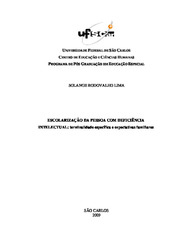Escolarização da pessoa com deficiência intelectual : terminalidade específica e expectativas familiares
Abstract
This research had as a general objective to analyze the coherence between the legal purpose of schooling of the mentally impaired and the meanings given by the family to this schooling in the ordinary classroom of the regular school. The specific objects were: a) to contextualize the national policies regarding education of the mentally impaired and to identify the bases on which they lie; b) to identify the perceptions and expectations of the families regarding the schooling of their intellectually impaired offspring who attend municipal schools in Uberlândia; c) to identify the specific terminality of schooling in the fundamental school of the mentally impaired student in the Special Education policies in Brazil, in the State of Minas Gerais and in the city of Uberlândia; d) to verify what the opinion of the families of mentally impaired students is regarding the specific terminality in the fundamental school. The research can be described as field research, analytical, based on documental reference. The population consisted of 149 members of families of the mentally impaired enrolled in sixteen municipal schools in the city of Uberlândia. 24 members of such families made up the sample, answering questions in a semi-structured interview. The answers were analyzed by means of content analysis. The main results show that: a) the area of special education, since the seventies, has been receiving more attention from the public authorities and has expanded, mainly since the nineties, trying to guarantee the access and permanence of the mentally impaired student in regular and special classes in public schools. Public policies for this area, following the example of the educational field, are oriented by neoliberal policies; b) the specific terminality policy in the national guidelines for education law and ratified by the Resolution number 02 of 2001 is one of the main concerns of the municipal education in Uberlândia, which has been trying to fully implement it, also in tandem with the State law for the same purpose, without, however, involving the families and/or the mentally impaired students; c) regarding the meaning and expectancies of the parents as to the schooling of their mentally impaired children, aspects such as learning and development, literacy and socialization are among the priority reasons for their children to attend classes, among the main contributions from the school in the life of the child and among the future expectancies regarding school; d) in relation to the opinion about the specific terminality we find three groups of family members: the ones who do not wished this certificate for their children, because they believed that it can be a way which will contribute to discrimination and want their children obtain the same certificate that ordinary students do; the ones who are for this policy and see, in the obtaining of the specific terminality the possibility to abbreviate the schooling time of the child in the fundamental school and thus find paid work; and the undecided who sometimes said they wanted the same certificate as regular students and sometimes found themselves unsure of the limits and possibilities of their child s learning. We conclude that, in spite of the advances, the schooling of the mentally impaired has to be rethought and that, in this process, the specific terminality ought to be deeply rediscussed, for as a legal instrument, it is not being suitable for the expectancy of the families, besides showing unfavorable risks to the schooling of students who are mentally impaired in Brazil.
